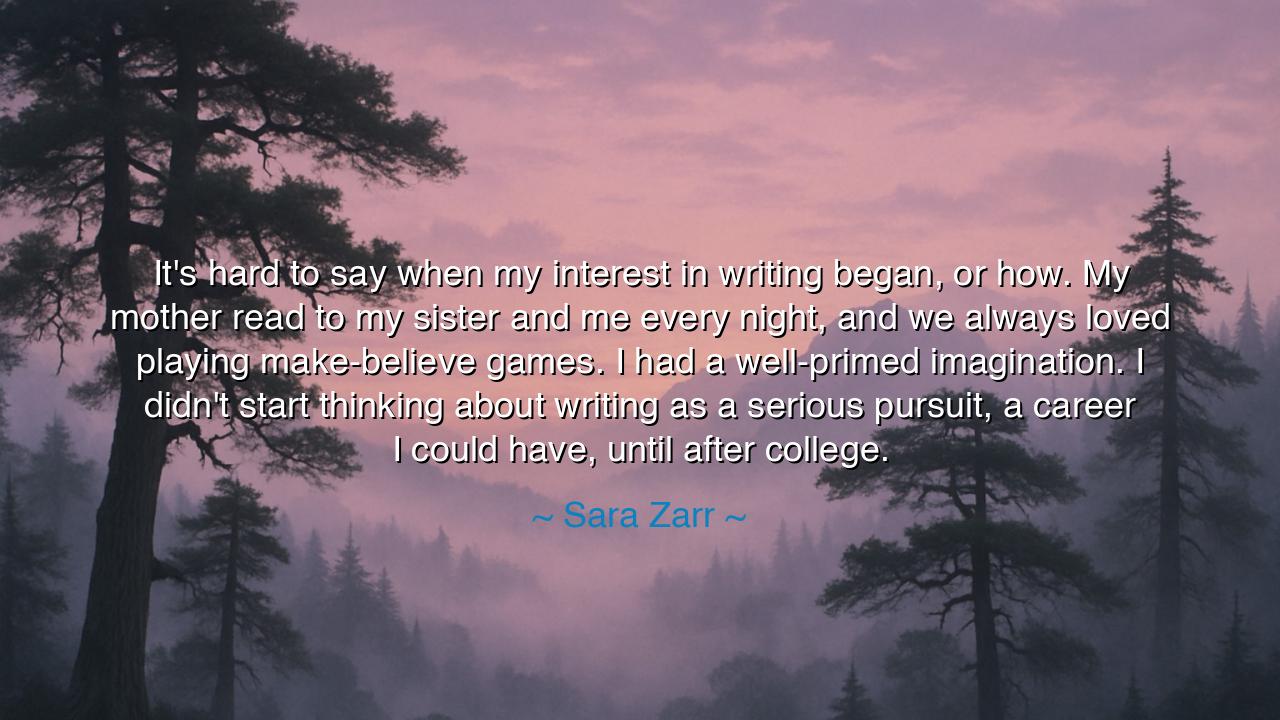
It's hard to say when my interest in writing began, or how. My
It's hard to say when my interest in writing began, or how. My mother read to my sister and me every night, and we always loved playing make-believe games. I had a well-primed imagination. I didn't start thinking about writing as a serious pursuit, a career I could have, until after college.






O children of the world, hear now the words of Sara Zarr, whose reflection on the genesis of her craft speaks to the deep, mysterious well from which all creative spirits arise. She said, "It's hard to say when my interest in writing began, or how. My mother read to my sister and me every night, and we always loved playing make-believe games. I had a well-primed imagination. I didn't start thinking about writing as a serious pursuit, a career I could have, until after college." These words reveal that the path to creation—to the art of writing—is often a journey born not from a single moment, but from a lifetime of experiences, dreams, and nurturing influences. The imagination that Zarr speaks of was not something she set out to cultivate as a child; it was the gift she was given through stories, through play, and through the everyday magic of her childhood.
Consider, O children, the ancient storytellers who passed down wisdom not through formal study, but through the natural rhythms of life. Homer did not start his journey with an idea of writing as a career. His stories, the Iliad and the Odyssey, were born of a world where imagination flowed freely, fueled by the world around him, the gods, the wars, and the heroes of his time. Homer's imagination was nurtured by the oral traditions of his culture, just as Zarr's was shaped by her mother's nightly readings and the games of make-believe. It is from these early seeds of play and story that the greatest tales arise, reminding us that the roots of creation are planted long before we set out to harvest them.
Zarr's story also reminds us that writing, like all true art, does not demand immediate recognition. Often, the artist is unaware of the purpose or potential of their gift until much later in life. Zarr did not initially think of writing as a serious pursuit, a career. She, like many before her, wandered through the world, cultivating her imagination with the simple joys of her childhood, not knowing that the same imagination would later shape her future. Writing began for her not as an ambition, but as an expression of the stories she had carried since her youth. It was only later, as an adult, that she saw the power of her words and realized that her love of storytelling could become a career.
Let us remember the life of Leonardo da Vinci, whose creative genius spanned far beyond the realm of art. Like Zarr, da Vinci's imagination was nurtured by his early experiences, his deep observations of the world, and his childhood wonder. Da Vinci, however, did not think of his creativity as a career in his early years. He simply pursued it with joy, making sketches, observing nature, and dreaming up inventions. It was only later in life, after years of developing his craft and ideas, that he realized he could be not just an artist, but an inventor, a scientist, and a visionary. His imagination was the foundation upon which he built his legacy, just as Zarr’s imagination became the spring from which her writing flowed.
O children, the lesson here is profound: creativity often begins in the quiet spaces of childhood, where stories, play, and dreams intertwine. Like Zarr, you may not initially understand that the imagination you are nurturing will one day grow into a career, a vocation, or a calling. It is in these early moments—when you are lost in the joy of play or in the worlds of books—that you are being prepared for greatness. Creativity does not always announce itself immediately; it grows quietly, steadily, and often unexpectedly, in the background of your life, awaiting the moment when you are ready to give it form.
Consider the path of J.K. Rowling, whose childhood was filled with dreams and stories she created, not with a thought of future fame or fortune. As a young girl, she loved writing stories about magical worlds, but it was only later, after years of struggle and reflection, that she realized she could turn her imagination into something greater. Rowling, like Zarr, did not start out thinking she would be a professional writer. It was only through the nurturing of her imagination and the strength of her passion that her creative spark became a career.
Thus, O children, take heart. Know that the imagination you are nurturing today, through play, through books, and through dreams, may one day grow into a vocation. But even if it does not, creativity will remain the greatest treasure you carry. It will shape your life, fill your days with wonder, and allow you to see the world through a lens that is rich with possibility. So cultivate your imagination—not for the sake of a career, but for the sake of your soul. Let your creative spirit guide you, and know that the stories you tell, whether in the pages of a book or in the heart of a conversation, are the truest reflections of who you are. Creation begins with the smallest spark, and even the simplest of childhood joys can light the way to something beautiful and lasting.






AAdministratorAdministrator
Welcome, honored guests. Please leave a comment, we will respond soon